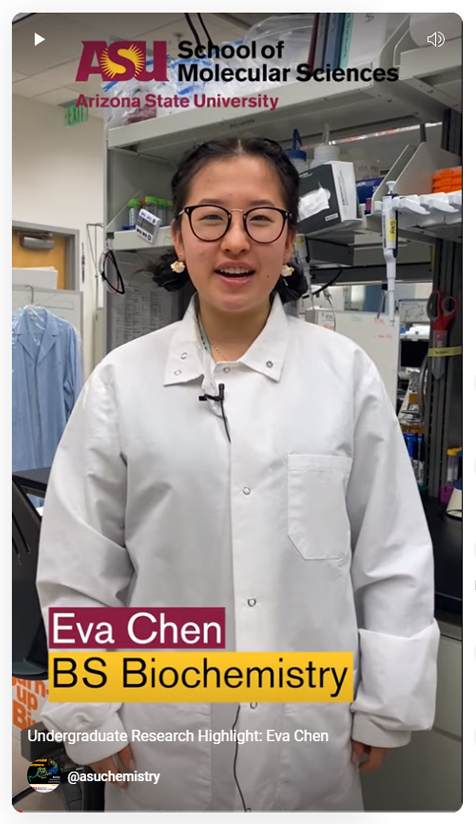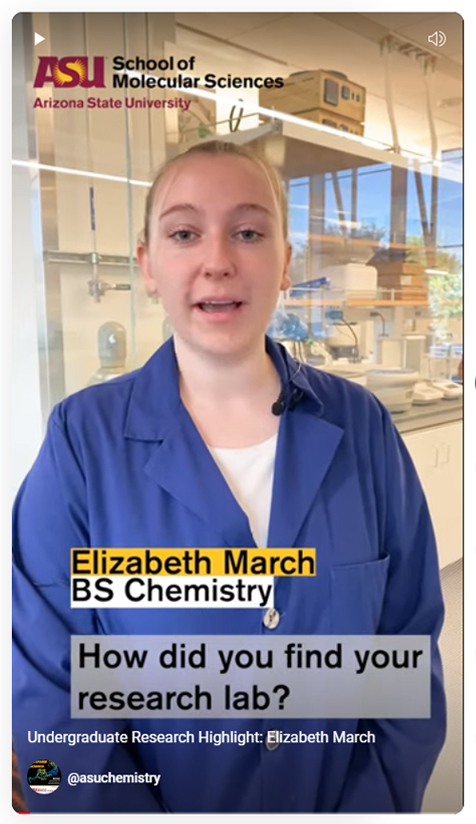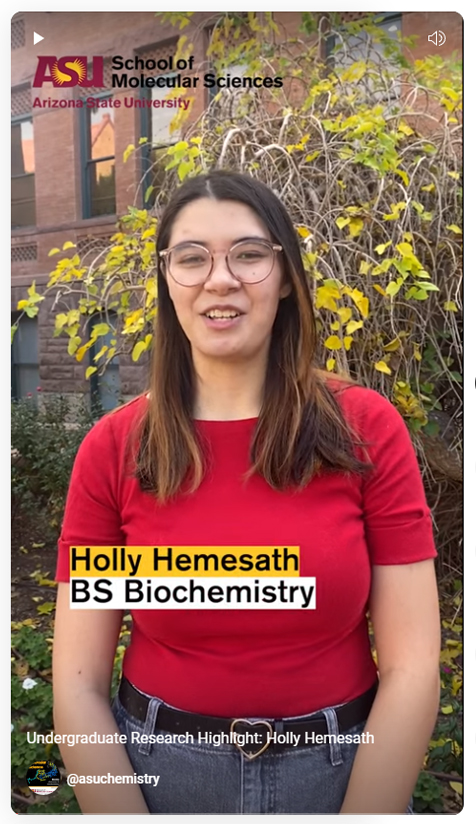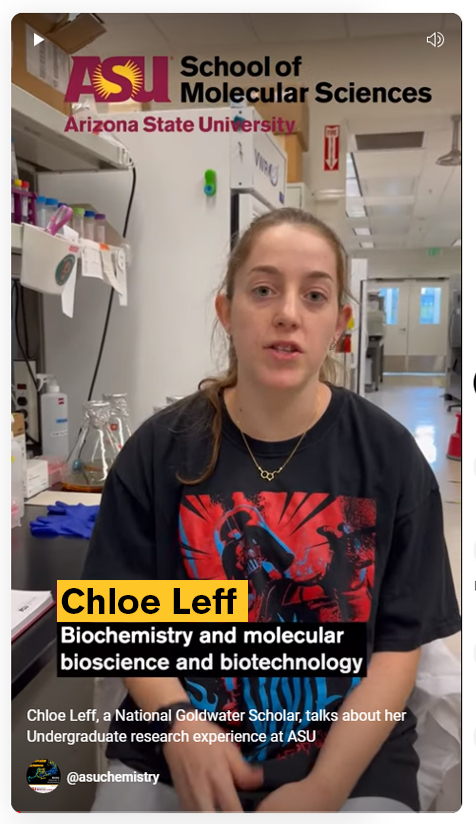Undergraduate Research
Undergraduates in the School of Molecular Sciences can enhance their preparation for careers in science by getting involved in research. Research requires a substantial time commitment, but it offers the excitement of scientific discovery, experience using state-of-the-art equipment, the possibility of publishing or presenting at scientific meetings, and allows students to receive credit.
If you are interested in graduate school in chemistry or biochemistry then research experience is an essential component of a competitive application.
Eva Chen talks about her work on delivery systems for nucleic acid-based vaccines.
Elizabeth March explains how she was able to join the Trovitch lab and work on catalysts for depolymerization.
Holly Hemesath describes her research work in computational biochemistry and how research has helped her academically.
Chloe Lefftalks about her work on DNA nanostructures and how this experience has helped to guide her career path
Get Started
Ways You Can Get Involved in Research in the School of Molecular Sciences (SMS):
- Volunteer: You can work in a faculty member’s lab on your own time.
- Paid Lab Assistant: A faculty member may be able to provide part-time financial support (ask the faculty member about that), or, some lab assistant jobs can be found through the ASU Student Employment link.
- Gain Course Credit: With permission from your faculty member and SMS you could earn college credit for research. Depending on your major, this credit could be applied to your degree requirements. Students cannot earn credit and be paid to do research in the same semester.
Finding a Lab
The best approach to getting into a lab is to find a faculty member who does research that you are interested in, study up on what they do a bit so that you can speak intelligently about it, and then approach them during office hours (preferably) or by email with your credentials / resume in hand and ask if they’d be willing to let you do volunteer research work in their group for course credit. You can find a list of faculty and their research interests here.
If you have difficulty with this approach, you may complete an interest survey form here:
Hey SMS Faculty, I’m Interested in Undergraduate Research!
Research-active SMS faculty have access to the back-end results of this survey – and those who are interested in recruiting undergraduate volunteers regularly check survey submissions. If they see a match between the characteristics of an undergraduate research volunteer they are looking for and your submission, they will contact you by email to further explore opportunities.
SMS students are encouraged to work in an SMS faculty member’s lab, however students, may also find research opportunities elsewhere, e.g. School of Life Sciences, Mayo Clinic, Biodesign Institute, etc. Non-SMS majors may also perform research in SMS if relevant to their major and career goals and after checking with their academic advisors.
Watch a short video with advice on finding a lab
Earning Credit
You can register for the following SMS research courses: CHM/ BCH 392 Introduction to Research; CHM/ BCH 492 Honors Directed Study; and CHM/ BCH 493 Honors Thesis.
- The BCH option should be selected by BA Biochemistry, BS Biochemistry and BS Biochemistry-Medicinal Chemistry majors.
- The CHM option should be selected by BA Chemistry, BS Chemistry and BS Chemistry-Environmental Chemistry majors.
- Students must choose an appropriate number of credits for their research course:
- 1 credit: minimum of 45 hours spent in the lab per semester
- 2 credits: minimum of 90 hours spent in the lab per semester
- 3 credits: minimum of 135 hours spent in the lab per semester
- Certain research courses are repeatable for credit
- Students not in the Barrett Honors College must select BCH/CHM 392.
- Students in the Barrett Honors College then choose:
- BCH/CHM 492 if they will write their thesis next semester.
- BCH/CHM 493 if they will write their thesis this semester and have completed BCH/CHM 492.
- BCH/CHM 392 if they have no immediate plans to write a thesis.
For additional information about Honor College thesis requirements see: BARRETT THESIS
School of Molecular Science chemistry or biochemistry majors must register for appropriate course credit using the Sign Up Now link below. The Sign Up deadline for each semester is same as the ASU session C add/drop deadline, check the Academic Calendar.
Please use your ASU Gmail account when accessing the form
Sign Up Now
All other majors must contact us at [email protected] and provide the following information:
- Ten-digit student ID number
- The course prefix you are interested in (i.e. BCH 392, CHM 392, etc.)
- The professor you will be conducting research with for the semester
We will need to provide you access to the application. After receiving the above you will be contacted by email to notify you when you have access to the Sign Up Now link above to complete the application process.
BCH/CHM 392
What Are the Expectations of Students (Syllabus)?
BCH/CHM 392 - Introduction to Research Techniques Summer 2025
Instructor: Your mutually agreed-upon research advisor
SMS Administrator: Prof. Chad Borges
Email: [email protected]
Class Meetings:
There are no official class meetings. Meet with your research advisor as needed.
Course Description:
Introduction to Research Techniques is a course designed to give credit to chemistry and biochemistry majors who are conducting undergraduate research in the laboratory of faculty members of the School of Molecular Sciences or chemistry- or biochemistry-related undergraduate research with faculty members of other departments.
Students conducting chemistry- or biochemistry-related undergraduate research with faculty members of other departments (e.g. School of Life Sciences) can enroll in the class with PRIOR authorization of the instructor. These students MUST include in the web-based authorization page a short description of the research project in which they will be participating. Approval to enroll in this class will ONLY be granted after the student has provided the required information and the research advisor has approved the request for enrollment in this class.
Credit Hours and Time Commitments:
Students have the option to enroll in this class during the fall and spring semester session for one or three credit hours. Students are required to dedicate a minimum of three hours per week per credit hour, as indicated below:
- 1 credit = minimum of 45 hours in the lab for the semester
- 2 credits = minimum of 90 hours in the lab for the semester
- 3 credits = minimum of 135 hours in the lab for the semester
Research advisors have the right to increase the minimum hours that a student must dedicate to undergraduate research per research hour. Faculty members have been asked to take into consideration the time that a student spends in the laboratory when determining the final grade. Failure to comply with the minimum time requirements could serve as the basis to grant a lower grade.
Honors Contracts:
Honors contracts are NOT available for this class. Honors College students are able to obtain honors credit for their participation in undergraduate research while working on their honors thesis through our two Honors Thesis courses: BCH/CHM 492 (Honors Directed Study) and BCH/CHM 493 (Honors Thesis) courses. These courses are usually taken during the senior year.
Grading:
Your final grade will be determined based on the grade recommendation from your research advisor and completion and presentation of your research poster.
If a student fails to submit and present their research poster, an Incomplete (I) grade will be assigned until this requirement is fulfilled. If a student completes and presents their research poster, the grade assigned by the faculty advisor will be awarded. Research advisors are required to provide the final grade through our web-based system by May 11, 2025. If a professor does not provide a final grade for a student by this date, an Incomplete grade (I) will be assigned until a grade is provided by the professor.
Final Poster Requirement:
Students enrolled in this course are required to present a poster at the SMS Research Symposium. The symposium will be held on April 29, 2025, from 5:00 to 8:00 PM, Arizona MST Time at the Carson Ballroom. Virtual attendance will be required for ASU Online students.
Students who have a class conflict with the SMS Research Symposium should contact Ruby Arjona ([email protected]) before January 25, 2025 for an alternative presentation method.
The cost of printing your poster will be covered by the School of Molecular Sciences.
Final Posters must be submitted for printing by April 22, 2025 at 11:59 PM, Arizona MST Time.
BCH/CHM 492 & 493
BCH/CHM 492 – Honors Directed Study
BCH/CHM 493 – Honors Thesis
Instructor: Your mutually agreed upon research advisor
SMS Administrator: Prof. Chad Borges
Email: [email protected]
Class Meetings: There are no official class meetings. Meet with your research advisor as needed.
Course Guidelines – Please download and read this important PDF document!
Course Description:
Barrett students are required to complete an Honors Thesis/Creative Project. SMS students should enroll for 3 credits of CHM/BCH492 (Honors Thesis Research) in the semester before they plan to defend their thesis. In the following semester, they should take CHM/BCH 493 (Honors Thesis) for their thesis defense. Note that the 493 course is not repeatable for credit. Please submit your Thesis Prospectus to Prof. Borges when you register for 492 to ensure that your thesis topic is appropriate for SMS and that your committee is properly constituted (see details below).
It is expected that in most cases a student will have started their research project before taking CHM/BCH 492. Students can take research for credit as CHM/BCH 392 in that case. Remember that students taking research for credit will be expected to spend at least 3 hours per week in the lab on average for each credit hour received. Most people will take research for 3 credits each semester and work at least 9 hours (on average) per week on their project.
Students may choose any area of interest to complete their project. For credit in CHM/BCH 492/493, the student must (1) be a chemistry or biochemistry major, and (2) be engaged in a thesis project with substantial (bio)chemistry content. It is not necessary that the project be undertaken in the laboratory of an SMS faculty member. (Majors doing research in other areas can always get credit in HON 492/493.) All chemistry and biochemistry students are encouraged to consider the opportunities within SMS and elsewhere at ASU, as well as in the Phoenix area or at other research institutions.
Tips for undertaking research in chemistry/ biochemistry at ASU can be found at: https://sms.asu.edu/student-life/undergraduate-experience/undergrad-research-opportunities. The American Chemical Society provides exceptional guidance for the advantages and challenges of undergraduate research in chemistry as well as tips for selecting a supervisor on their website. There are books on the topic as well. (Getting In by Oppenheimer and Grey is an excellent book published in 2015 and available on Amazon in softcover.)
Guidelines for Thesis Committee Membership: The Director must be an ASU faculty member (per Barrett’s rules) and preferably a member of SMS. Although Barrett specifies a minimum of 2 thesis committee members, SMS requires all majors to have 3 members on their committee. The Director and Second Committee Member are required to be ASU tenure-track faculty. At least one member of the committee must be a faculty member of SMS. The Third Committee Member must have a PhD and does not have to be a faculty member but cannot be a subordinate of either of the other two members (e.g. postdoctoral fellow or research professor in the same research group). For a student doing research with a mentor who is not an ASU faculty member (e.g. at TGen, Barrow, VA Hospital), the research mentor would have to be the Third Committee Member and the student would have to recruit from among the ASU faculty (preferably in SMS) a Director who is nominally in charge of the thesis.
Final Poster Requirement:
All students enrolled in BCH/CHM 492 and BCH/CHM 493 are required to present a poster at the SMS Research Symposium. The symposium will be held on April 29, 2025, from 5:00 to 8:00 PM, Arizona MST Time at the Carson Ballroom. Virtual attendance will be required for ASU Online students.
Students who have a class conflict with the SMS Research Symposium should contact Ruby Arjona ([email protected]) before January 25, 2025 for an alternative presentation method.
The cost of printing your poster will be covered by the School of Molecular Sciences.
Final Posters must be submitted for printing by April 22, 2025 at 11:59 PM, Arizona MST Time.
Grading
BCH/CHM 492 students who perform satisfactorily automatically receive a grade of “Z” for the semester. Once they have completed BCH/CHM 493 and a grade is assigned by the research advisor, both courses are given the same final grade.
BCH/CHM 493 students must submit a thesis and complete an oral defense of that thesis. Final grades are assigned by the research advisor.



